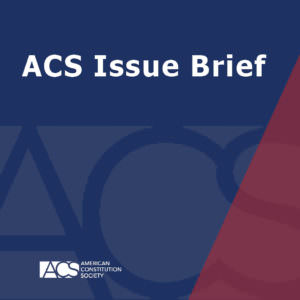Another Attack On Election Reform: Congressional Redistricting Commissions
Lerner Family Associate Dean for Public Interest and Public Service Law; Professorial Lecturer in Law, George Washington University Law School
In 2011, the Supreme Court struck down an attempt by Arizona voters to strengthen the integrity of state government through a public financing scheme for state elections. Now, just four years later, the Court is weighing the constitutionality of Arizona voters’ next attempt at electoral reform. In this issue brief, Morrison argues that the Supreme Court should let stand the state’s independent redistricting commission, which voters created fifteen years ago to increase electoral competitiveness and put reasonable limits on partisan gerrymandering.
In Arizona State Legislature v. Arizona Independent Redistricting Commission, the Arizona legislature claims that the Constitution gives it the exclusive, non-delegable power to redraw the state’s Congressional districts. In this issue brief, Morrison asserts that the legislature lacks standing to challenge the constitutionality of the independent redistricting commission and that, even if the Court decides to hear the merits, the legislature’s arguments should be dismissed. As Morrison concludes: “For those who still sustain a hope that non-partisan redistricting commissions can reduce the likelihood of partisan gerrymandering, and thereby increase democracy in the process of selecting members of the House of Representatives, they should be rooting hard that the Court rejects the position of the Arizona legislature.”
Read the full Issue Brief here: Another Attack on Election Reform: Congressional Redistricting Commissions
By Alan B. Morrison

